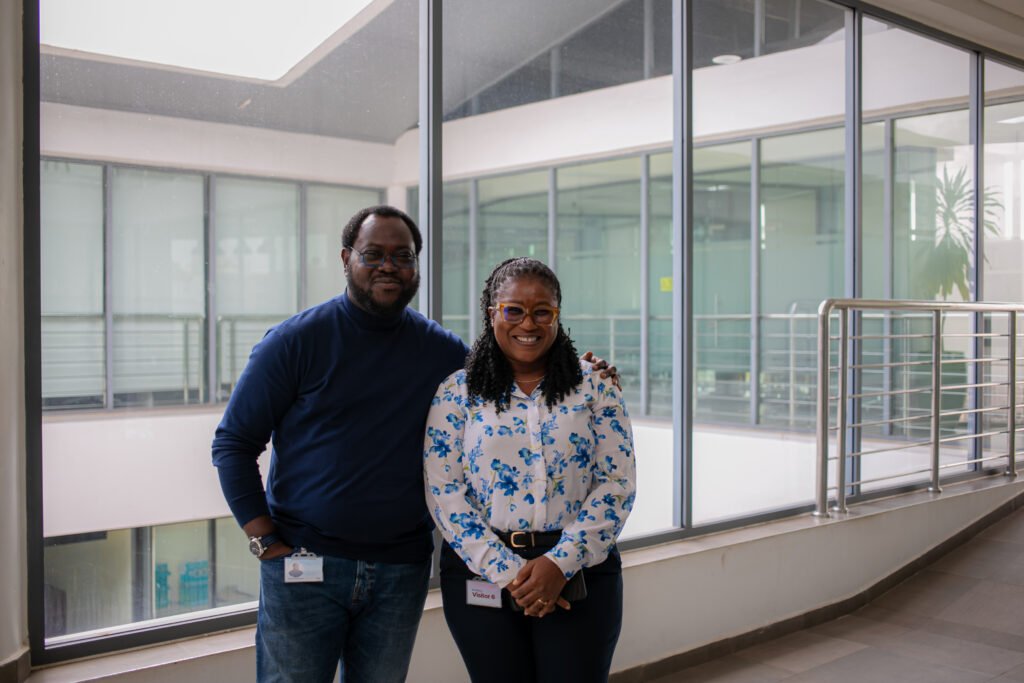Mr. Chukwuma Nwanze is the MD/Chief Executive Officer of Credit Direct Finance Company Limited, one of Nigeria’s leading embedded finance companies. He joined the organisation in 2012 as Head of Strategy and Business Development, where he played a pivotal role in the development of the company’s first Loan Management System, marking the beginning of its digital transformation journey. Over the years, he has held various leadership positions, including Chief Finance Officer and Executive Director of Finance and Strategy.
In 2023, he was appointed MD/CEO, bringing over a decade of experience in financial structuring, reporting, and management. Under his leadership, Credit Direct has undergone a significant digital transformation, leveraging artificial intelligence and automation to enhance customer experience and operational efficiency. The company has introduced innovative products such as the Credit Direct Mobile App, CLARA (an AI-powered assistant), and the Buy Now, Pay Later solution, positioning itself as a digital-first financial technology company. Mr. Nwanze holds a Bachelor of Business Administration from Cambridge International College and is a Doctoral candidate in Business Administration at Edinburgh Business School, Heriot-Watt University. He speaks on his commitment to fostering a culture of innovation, excellence, and empathy within the organisation, aligning with Credit Direct’s mission to ensure access to financial solutions as a universal opportunity.
So, looking at FinTech in Nigeria, what trend do you foresee shaping the future of embedded finance and digital learning?
I believe FinTech is rapidly becoming a buzzword. In the next five years, I doubt we will even refer to them as FinTech companies, as every financial instrument will inherently be digitally specific. Every financial instrument will embody FinTech, driven by seamless Application Programming Interface (API)-led integrations where systems and platforms communicate effortlessly. We anticipate intelligent, swift, and astute decision-making as AI becomes deeply embedded across every facet of finance, fostering more inclusive lending.
This will enable on-the-spot credit decisions, irrespective of their complexity. The growth of embedded finance will be significant, with Credit Direct proudly leading this charge not only in Nigeria but across Africa. We foresee a surge as finance becomes seamlessly incorporated into everyday living. This transformation is set to unfold rapidly in the coming years. Furthermore, I anticipate substantial growth in financial inclusion, directly linked to the increasing smartphone penetration and internet accessibility in Nigeria. As the world becomes increasingly mobile, the FinTech space will witness considerable activity and innovation.
Since your appointment as MD/CEO in 2022, what have been the most transformative changes you have driven at Credit Direct?
I have been with Credit Direct for 13 years in total, including the decade prior to my CEO appointment. The transformative changes since my appointment are a continuation of the excellent work initiated by my predecessor and the dedicated team, a legacy I am immensely proud to have inherited and built upon. My primary responsibility has been to digitally transform Credit Direct, a mission that has yielded significant milestones over the past two and a half years.
Firstly, we have diversified significantly beyond traditional lending, now offering digital payments, retail investments, and widely available embedded finance solutions. Our all-in-one mobile app, launched earlier this year, already serves over 200,000 customers, and we are targeting one million users within the next few months. We have fundamentally reorganised as a digital-first business, ensuring all our verticals—lending, payments, and investment—are digitally centric. We operate as an essentially paperless organisation; one would be hard-pressed to find a printer here, reflecting our commitment to this aspiration. We have now integrated digital technology into every aspect.
Our customers can access credit in as little as two minutes today. For instance, individuals dialling *5120# receive funds instantly, while those utilising our WhatsApp channel gain access within minutes. Similarly, accessing credit via mobile or web is equally swift. Our ‘buy now, pay later’ solutions, for example, enable customers to purchase devices within seven minutes, allowing them to leave the store with their new phone. These transformational changes have unfolded over the past two and a half years under my leadership. However, equally paramount has been driving the transformation of our people; I firmly believe no organisation can truly thrive without a strong foundation in its human capital.
Our workforce productivity has more than doubled in recent years, a direct result of our efforts to reshape our culture towards enhanced output. This has led to comprehensive business transformation across financial performance, digital offerings, and customer perception. Crucially, we have experienced a profound cultural transformation within our team; as we grow more productive and energised, our values are directly reflected in the overall financial performance of the business.

So let’s look at CLARA. Can you share its impact with us?
Certainly, let me tell you about CLARA, which stands for Credit, Lifestyle, and Revenue Assistant. CLARA emerged from our Innovate Fest programme in 2023, built by a young individual who had just completed their National Youth Service Corps (NYSC). This exemplifies Credit Direct’s inherent culture of bottom-up innovation. As an AI-powered assistant, CLARA aids customers with loan decisions, will soon guide investment choices, and provides answers to all queries related to their Credit Direct journey.
From a business perspective, CLARA has been highly instrumental, significantly enhancing our operations by responding to inquiries 20 times more efficiently than our contact centre agents. While AI is crucial, we ensure CLARA always maintains a human touch. The common query is whether AI will lead to job losses. My consistent response is that for a forward-thinking organisation, AI complements the existing workforce. While acknowledging potential challenges and ethical considerations, I often argue that for a nation like Nigeria, with its young population and high youth unemployment, AI can significantly reduce inefficiencies—performing tasks that might otherwise require 500 people. Therefore, finding the right balance is paramount.
Our aim is to balance leveraging AI for operational efficiency while continuing to create employment opportunities, as AI-driven efficiency facilitates business expansion. Ultimately, we strive to achieve a harmonious balance between technology and humanity.
So, having risen through the ranks from Head of Strategy to the MD/CEO, what leadership thoughts have defined your approach to building a future-ready FinTech company?
A key lesson throughout my 13 years at Credit Direct, from Head of Strategy to CEO, is that strategy alone is insufficient; it is people who make strategy tangible. For any strategy to work effectively, an engaged workforce is crucial. Our recognition as a ‘great place to work’ is a testament to the exceptional people we are blessed with at Credit Direct, who genuinely enjoy their roles.
For leaders, a daily combination of courage, adaptability, and emotional intelligence is paramount. With nearly a thousand diverse employees at Credit Direct, the challenge lies in unifying everyone towards a common direction while preserving individual identity. Our greatness as an organisation stems from individuals being able to truly be themselves while collaborating effectively. Vision is important and powerful, but culture is paramount. We spare no effort in cultivating the right culture, as it integrates our unique experiences without diluting individual identities. When these experiences converge towards a common goal, operations become seamless.
Our business has consistently grown by nearly 90 per cent annually—a rate surpassing most Nigerian financial institutions—which I directly attribute to our people’s culture. Indeed, as Peter Drucker famously stated, “Culture eats strategy for breakfast,” a philosophy central to my leadership.
What would you say in the past two years that you assumed office gives you joy about your performance?
Witnessing the transformation of the business brings me immense joy. What initially seemed a long-term undertaking became achievable through the ambitious targets my team and I set. In just two and a half years, the business I inherited is fundamentally different from what exists today.
It is truly exciting to confidently state that we have digitally transformed this business, crucially, without the organisation losing its soul. We have retained our identity and essence as a collective, transforming the business successfully while achieving outstanding results, all without making our people unhappy.

What’s next for Credit Direct under your leadership?
What is next for Credit Direct? We intend to continue dominating our chosen niche in the financial services industry, committed to realising our vision of becoming Africa’s leading embedded finance business, extending our footprint beyond Nigeria into the broader African continent in the coming months.
We will deepen our focus in new ventures while maintaining our credit-led identity, broadening our spectrum in payments, investments, and other financial services. Beyond being a technology-first organisation, we will lead with artificial intelligence in credit decisioning, driving operational efficiency, and enhancing customer centricity.
What’s your perspective on the growing intersections of AI, automation, and financial services?
The intersection of AI, automation, and financial services is significant. I believe AI can be effectively layered onto automation; the more automated a business, the easier it becomes to fully leverage AI’s benefits. AI itself will become commonplace and highly commoditised in the coming years. Its applications today are vastly different from two or three years ago, and I am confident that within five years, it will be so normalised, we may even refer to it by another name. However, technology evolves incredibly quickly.
From simple automation, we saw machine learning, then robotic process automation. Ultimately, systems and technologies will become far smarter. They will not only mimic human wisdom but surpass it. Businesses must leverage this new knowledge for efficiency, though always within safe governance frameworks. Crucially, as Africans, we must not misuse artificial intelligence, as our societal narratives differ from those of the Western world. For example, while Norway or Sweden contend with ageing populations, Nigeria faces millions of unemployed graduates and 25 million out-of-school children.
We must find the right balance: participating in global evolution while ensuring AI aligns with our cultural and national realities. Copying Western contexts is artificial; we must contextualise AI for our specific needs. I believe AI will be amazing, driving business transformation. However, people will always be essential, as everything is imbued with soul, which originates from people, especially within a strong organisational culture. This means embedding financial services—lending, payments, savings, and insurance—into the everyday lives of people and businesses without requiring traditional brick-and-mortar processes or complex financial institutions.
It’s about meeting people where they are, in their communities and marketplaces, where they may not yet have access to these products. Consider this: if you are on a train and run out of money, being able to access credit to complete your journey demonstrates truly embedded finance. It is about integrating finance into everyone’s everyday life.
What sets us apart is our identity as a credit-first, capital-light, and purpose-driven organisation. We have passionately focused on credit for 18 years.
This business, like many others, has only raised capital once in 18 years, proving our capital efficiency and consistent profitability. We achieve this by working through payroll systems, cooperatives, and various e-commerce platforms. By blending technology with our extensive market knowledge, we have consistently provided real value to our customers, dealers, and businesses alike over the years.
So for this past 18 years or so, what has been the most challenging thing that you have faced?
In its 18 years of existence, the organisation has navigated a global financial meltdown and two recessions, building significant resilience. Today, we have served nearly 2 million customers, providing access to credit, payments, and investments for the underserved. The key lesson learned is that the right business approach guides you through difficult times. We have survived turbulent seasons—marked by macroeconomic challenges and unforeseen storms—due to our resilient model and, crucially, the trust our customers place in us. That trust is a byproduct of the value we create.
As a purpose-driven organisation, our focus extends beyond mere profits to making a meaningful impact on our customers’ lives. For instance, some of our customers’ children have gained access to proper education through our facilities. Indeed, I have four colleagues whose parents previously used our services to fund their schooling, demonstrating the full-circle impact when they later joined us as employees. This purpose mindset drives us, ensuring we impact the communities we serve. While profitable, we are committed to ensuring our operating society feels the organisation’s positive impact beyond mere profits.
How is Credit Direct navigating regulatory shifts in the Nigerian financial system?
We are regulated by the Central Bank of Nigeria, the apex bank, and I view them as partners in our progress. They introduce the discipline, governance, and security essential for every business. Their frameworks help organisations structure themselves to provide shareholder value and make a meaningful societal impact, which I believe is essential for any successful business.
Regulators, for me, are partners; they compel deep thought into what truly constitutes a good business. Thus, a sustainable and successful business operates with a solid regulator. We are always pleased to be regulated by the Central Bank, as their detailed guidelines make us a better organisation. While some perceive regulatory oversight as overreach, I believe it positions us for future sustainability and helps avoid ‘concern issues.’ That is my perspective.
What role does the Credit Direct Mobile app play in deepening financial inclusion?
Our Credit Direct Mobile app, launched two months ago, already has approximately 200,000 active users. Central to our business is making financial solutions a universal opportunity, with a constant focus on the underserved and underbanked. Our mobile platform is a key channel, enabling the underserved to borrow, save, invest, and grow. Users can achieve decent returns on investments, facilitate daily payments, and access credit for daily life management.
Crucially, access is not limited to hyper-urban areas; individuals in semi-urban and rural regions also benefit. Credit Direct operates in approximately 25 Nigerian states, covering numerous local governments, serving customers beyond urban centres. It is fundamental to our essence to provide digital channels that reach everyone. Beyond the mobile app, our USSD products cater to those without smartphones, allowing credit access via feature phones by dialling *5120#. Most customers using this service can perform numerous transactions via the short code. As a technology-first digital finance company, we prioritise efficient reach over traditional channels, and we observe consistent daily traction.

























